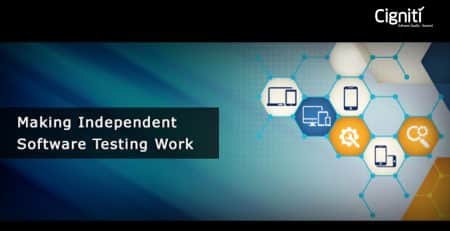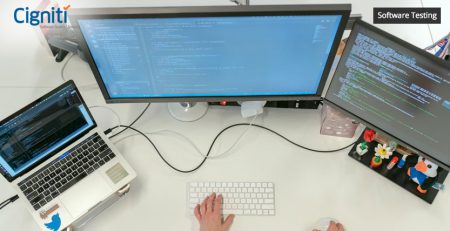Know how AI helps Transform your Software Delivery and Testing practices
Software Testing and Quality Assurance is like a wakeup call in the Software Development lifecycle. It keeps nudging over intervals and enhances the software delivery process. Software Testing and QA scene has been transforming over the last decade, especially, with practices such as Agile, Shift-left, and DevOps. Artificial Intelligence (AI) has added another spin to this game, focussing on Speed, Accuracy, and Efficiency. Can AI transform Software Delivery and Testing; is a doubt that has been clarified very well. Let’s look at ways in which AI can change the game for Software Delivery and Testing.
AI can bring in value for the development teams with shift-left practices that enable the software development process. While AI might do the needful, it is important to ensure that the practices followed for delivery and testing are effective and are able to leverage the power of AI. Hence, it is very much essential to embed trust in the processes and ensure that there is effective validation and verification.
Practically, AI is being implemented in parts across the software development process along with automated software testing tools. AI-enabled tools and platforms ensure that the code achieves maximum test coverage and prioritizes the testing needs. It brings better efficiency and enables the teams to run more tests within shorter timeframes. Its application is possible and effective across any major industry to ensure velocity and accuracy for various projects.
In the current scenario, machines are developing and analyzing content for various platforms such as delivering targeted ads and content for the customers. This is done by leveraging various platforms to dig into the data and make sense out of it. The idea is to form patterns and make relevant connections, and accordingly build algorithms to derive the outcome.
AI bots can be trained on complex and repetitive tasks for software testing purposes, which not only help to save time, but also bring efficiency. This can bring down high failure rates, reduce the costs and boost the productivity for all testing activities. Moreover, it will help to plug the gaps between inadequate infrastructures for delivering testing results and bringing down the failures and glitches.
Can AI boost the Software Testing process?
Software Testing is absolutely fundamental to the software development process, hence, it is undeniably critical to ensure its effectiveness to deliver a robust application. There are times when developers and testers fail to perform the testing tasks rigorously. In such cases, AI platforms bring value and an elaborate load of feature to make the process faster and easier. Additionally, AI has been leveraged to bring the much needed intelligence to the software development and testing process with repetitive patterns.
Today, enterprises and businesses need faster deployments within inadequate infrastructures. Hence, AI is being leveraged in an appropriate way to deliver what is quintessential in the testing and development cycle. Even the software application scene is loaded with cyber risks and security issues. This requires tremendous automation and even a serious check on the costs. Implementing AI might demand investment in the initial phase, but the results are something to look forward to.
Additionally, AI can even help provide innovative testing environments to test an application. This is the need of the hour, as an application is bound to encounter unforeseen and unpredictable situations in the user environment. Hence, it makes absolute sense to deal with a combination of situations while the application is under test. This might not be possible in a manual testing environment, as the time taken to create an environment is much longer in a manual set-up and needs much more maintenance.
In an AI set-up, the maintenance requirements are minimal and the overall process is automated. This is possible, as AI involves loads of manual as well as automated plug-ins for enabling the software testing process. It incorporates substantial machine-generated data to derive results and contribute to the testing and development tasks. That’s the reason developers are considering a lot of AI-enabled automation to enhance efficiency in the testing domain.
AI algorithms bring immense value in the testing industry to make the software application much smarter and productive, especially, for the end user. If analyzed in detail, it is important to identify the areas where the algorithms can be applied and incorporated within the application. It will enable effectiveness while testing and facilitate the development process as well.
Furthermore, AI applications can even help in generating and optimizing the test cases, prioritizing and automating the testing activities, and overall enhancing UI testing and other analytical tasks.
Whether it be the health, finance, or entertainment sector – every industry is trying to innovate and use AI-based apps that help automate tasks. However, there are multiple testing related challenges that organizations may face while leveraging AI for testing apps for quality, such as identifying the exact use cases, lack of awareness as to what really needs to be done, verifying the behavior of the apps based on the data that has been input, testing the app for functionality, performance, scalability, stability, security, and much more for it to be successful.
Hence, you need expertise to implement the AI-enabled platforms effectively for your testing and development needs. Cigniti’s BlueSwan™ is a next generation Proprietary Testing platform. Aligning with the needs of the market in the digital era, BlueSwan also is Cigniti’s enabler towards being the leader in independent software testing services. It also fortifies our IP led software testing services approach along with the Cigniti 4.0 services and Domain centric approach for offering world class testing services to business across the different verticals. BlueSwan™ helps accelerate Quality Engineering for the Digital Enterprises.





Leave a Reply